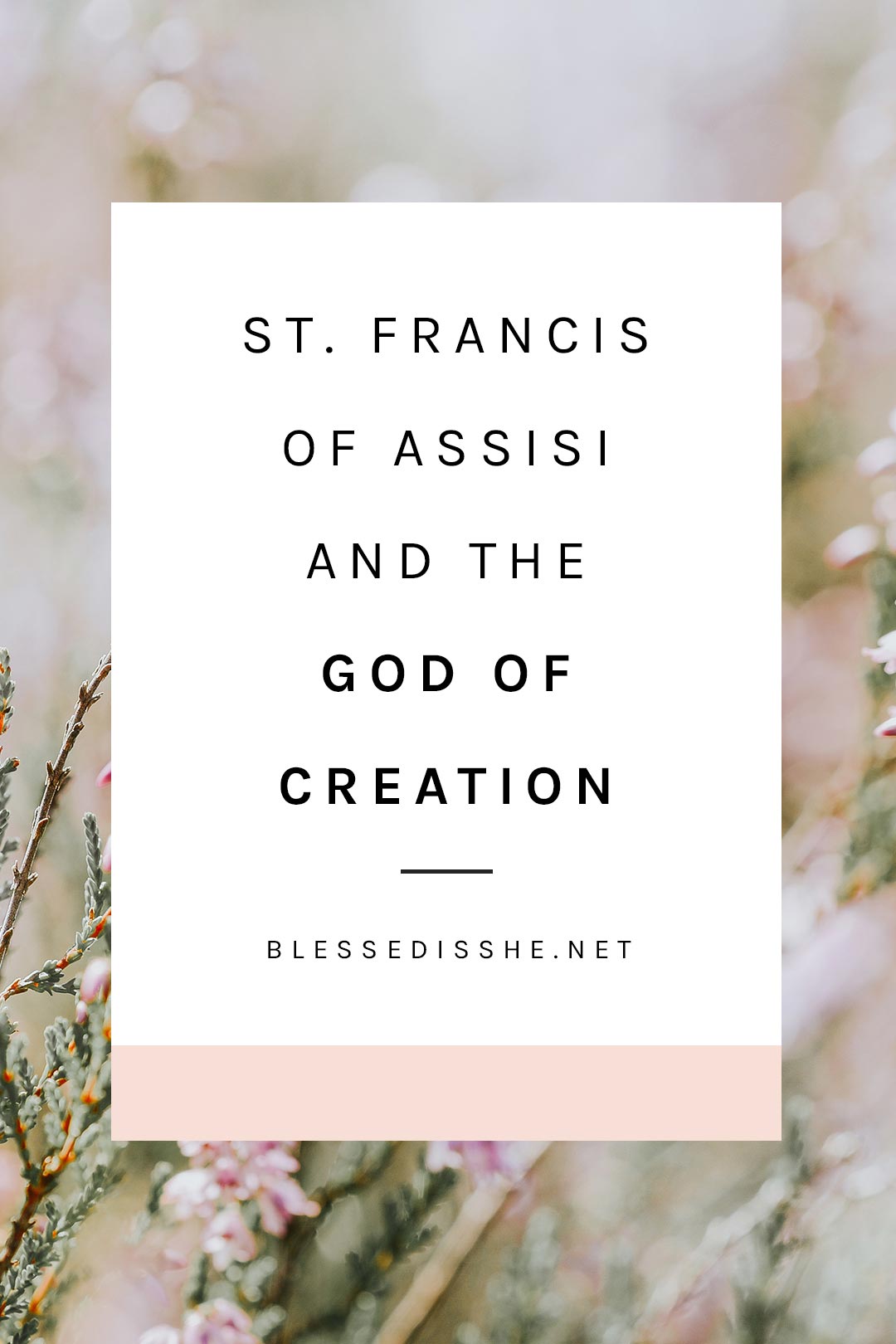
Today marks the much-celebrated feast of St. Francis of Assisi. Without him, our churches would be void of Crèches at Christmastime and our animal companions would go unblessed (for starters). Francis loved any reason to gather people together to give praise to God. If that meant sheep and a donkey in the church courtyard for a living nativity, so much the better!
The heavens declare the glory of God. – Ps. 19: 2-5
Our God of Creation
Because of the creative nature of God, the Church has long held the concept of two books of revelation: Scripture & creation, each illustrating and revealing to humanity who God is. Our divine imaginations are stirred in a variety of ways. This is why we can study the inspired Word of God and observe its Truth in the "book" of creation as well.
St. Francis grasped this early, as written beautifully in his Canticle of Creation. Pope Francis grasped this inspiration early in his papacy as he penned the Encyclical letter, Laudato Si:
I do not want to write this Encyclical without turning to that attractive and compelling figure, whose name I took as my guide and inspiration when I was elected Bishop of Rome. I believe that Saint Francis is the example par excellence of care for the vulnerable and of an integral ecology lived out joyfully and authentically.
He is the patron saint of all who study and work in the area of ecology, and he is also much loved by non-Christians. He was particularly concerned for God’s creation and for the poor and outcast. He loved, and was deeply loved for his joy, his generous self-giving, his openheartedness. He was a mystic and a pilgrim who lived in simplicity and in wonderful harmony with God, with others, with nature and with himself.
He shows us just how inseparable the bond is between concern for nature, justice for the poor, commitment to society, and interior peace.
![]()
![]()
Catholics and Creation
Certainly there have been questions raised over the Church’s taking a position on matters of the environment as an issue of morality. But three themes stand out that suggest St. Francis and Pope Francis are each pointing us toward a more just and accountable role within our world as a people of faith.
1. Evaluating our identity as stewards of the gifts God has given.
We are not God. The earth was here before us and it has been given to us. This allows us to respond to the charge that Judaeo-Christian thinking, on the basis of the Genesis account which grants man “dominion” over the earth (cf. Gen 1:28), has encouraged the unbridled exploitation of nature by painting him as domineering and destructive by nature. This is not a correct interpretation of the Bible as understood by the Church. -Laudato Si, 67
Simply put, our misguided interpretation of the word “dominion” has become a stumbling block. Rather than understanding humanity’s role as one of dominating the earth and its richness for a quick profit, we are challenged to cultivate it. Much like the farmer who chooses to plant cover crops, or rotate their crop is investing in the future health of their soil and its yield, we as stewards of creation are encouraged to take the long view as well.
Where am I being invited to act as a steward?
2. Acknowledging our responsibility to God’s anawim, those who live on the margins.
For example, changes in climate, to which animals and plants cannot adapt, lead them to migrate. This in turn affects the livelihood of the poor, who are then forced to leave their homes with great uncertainty for their future and that of their children. There has been a tragic rise in the number of migrants seeking to flee from the growing poverty caused by environmental degradation. They are not recognized by international conventions as refugees. They bear the loss of the lives they have left behind without enjoying any legal protection whatsoever.
Sadly, there is widespread indifference to such suffering, which is even now taking place throughout our world. Our lack of response to these tragedies involving our brothers and sisters points to the loss of that sense of responsibility for our fellow men and women upon which all civil society is founded.
The people of West Africa surrounding the Lake Chad basin, coastal Bangladesh, Puerto Rico, and parts of coastal Louisiana, and Alaska, are already experiencing this phenomenon. And yet, "climate refugees" do not receive refugee status. They are not fleeing violence or persecution as the term "refugee" has traditionally been defined. To create this new category of displaced refugees would further stretch the funds available to those who are fleeing violent circumstances. Perhaps this explains the "lack of response" that Pope Francis describes. But the problem is clear and growing.
What is one habit I can learn that would benefit God’s anawim, those in greatest need?
3. Reverencing God as the Divine Creator, Author of creation.
Never have we so hurt and mistreated our common home as we have in the last two hundred years. Yet we are called to be instruments of God our Father so that our planet might be what he desired when he created it and correspond with his plan for peace, beauty, and fullness. -Laudato Si, 53
Air pollution from vehicles and industries. Unsustainable farming practices. Loss of rainforests. Waste so prevalent it has created an island twice the size of Texas in the Pacific Ocean. These are certainly recent contributors to the problem before us. Many of humanity’s great advances and discoveries have come with a tremendous amount of convenience and disposability.
We believe that creation itself is God’s self-revelation, and that we are made in the image and likeness of God. So this “throw away culture” that Pope Francis dubbed in 2013 remains as harmful for the environment as it is for the human person. It undermines the value of the good gifts we know to be from the Divine Creator.
What is one new practice I can adopt to care for the gift that is our common home?
St. Francis of Assisi, Lover of God in Creation
As followers of Christ, we already know that the right way and the easy way are not synonymous. In the spirit of St. Francis of Assisi, may we too be remembered for our reverence of this divine gift that is our earthly home.
St. Francis of Assisi, pray for us!
St. Francis of Assisi and the God of Creation #BISblog //Click to tweet
































